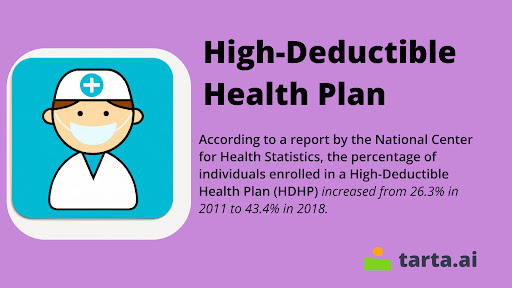Outlook Of High-Deductible Health Plan Advantages and Disadvantages

PHOTO: 121benefits.com
What is a High-Deductible Health Plan (HDHP)?
A High-Deductible Health Plan (HDHP) is a type of health insurance plan that typically has a higher deductible than traditional health insurance plans. A deductible is the amount of money that you are responsible for paying out of pocket before your insurance coverage kicks in and starts paying for medical expenses.
To qualify as an HDHP, the plan must meet certain requirements set by the Internal Revenue Service (IRS). As of 2021, the minimum deductible for an HDHP is $1,400 for an individual and $2,800 for a family plan.
HDHPs typically have lower monthly premiums than traditional health insurance plans, which can make them an attractive option for individuals or families looking to save money on their healthcare costs. However, because of the higher deductible, individuals may be responsible for paying more out of pocket for medical expenses before their insurance coverage kicks in.
In addition to the higher deductible, HDHPs also typically have an out-of-pocket maximum, which is the maximum amount that you will have to pay out of pocket for covered medical expenses during a calendar year. Once you reach the out-of-pocket maximum, your insurance coverage will typically cover the remaining cost of covered medical expenses for the rest of the year.
Some HDHPs can be paired with a Health Savings Account (HSA), which allows individuals to save money on a tax-free basis to pay for eligible medical expenses. HSAs can provide additional savings and flexibility to help offset the higher out-of-pocket costs associated with HDHPs.
Overall, HDHPs can be a good option for individuals or families who are generally healthy and looking to save money on their monthly premiums, but it's important to carefully consider your healthcare needs, budget, and risk tolerance before choosing an HDHP. By the way, there are also similar plans for Insurance.
Advantages of HDHPs
- Lower monthly premiums: HDHPs typically have lower monthly premiums than traditional health insurance plans. This can be significant cost savings for individuals and families who are generally healthy and don't require frequent medical care.
- Potential for tax savings: HDHPs can be paired with a Health Savings Account (HSA), which allows individuals to save money on a tax-free basis to pay for eligible medical expenses. HSAs can provide additional savings and flexibility to help offset the higher out-of-pocket costs associated with HDHPs.
- More control over healthcare spending: With an HDHP, individuals are typically responsible for paying a higher deductible before their insurance coverage kicks in. This can give individuals more control over their healthcare spending, as they may be more likely to consider the cost of medical treatments and procedures before agreeing to them.
- Flexibility: HDHPs can be a good option for individuals who are self-employed or have irregular income, as they can provide a more affordable option for healthcare coverage.
- Can encourage preventative care: Some HDHPs offer certain preventive care services, such as annual physicals, at no cost before the deductible is met. This can encourage individuals to seek out preventative care services, which can ultimately help prevent more costly health problems down the line.
Overall, HDHPs can be a good option for individuals or families who are generally healthy and looking to save money on their healthcare costs. However, it's important to carefully consider your healthcare needs, budget, and risk tolerance before choosing an HDHP.

What is the difference between HDHPs and HSAs?
High-Deductible Health Plans (HDHPs) and Health Savings Accounts (HSAs) are often used together, but they are not the same thing. Here are the main differences between HDHPs and HSAs:
- HDHPs are a type of health insurance plan that typically has a higher deductible than traditional health insurance plans, while HSAs are tax-advantaged savings account that can be used to pay for eligible medical expenses.
- To qualify for an HSA, you must be enrolled in an HDHP. Not all HDHPs are HSA-eligible, but HSA-eligible HDHPs have certain requirements, including a minimum deductible and maximum out-of-pocket limit set by the Internal Revenue Service (IRS).
- Contributions to an HSA can be made on a pre-tax or tax-deductible basis, which can lower your taxable income. Additionally, the money in an HSA grows tax-free, and withdrawals for eligible medical expenses are also tax-free.
- HSAs are owned by the individual, and the funds in the account can be carried over from year to year. This can make them a good option for individuals who want to save money for future healthcare expenses.
- HDHPs and HSAs can provide cost savings for individuals who are generally healthy and don't require frequent medical care. However, it's important to carefully consider your healthcare needs, budget, and risk tolerance before choosing an HDHP and/or HSA.
Overall, HDHPs and HSAs can be used together to provide a lower-cost option for healthcare coverage and savings on eligible medical expenses. However, it's important to understand the differences between the two and how they can work together to meet your healthcare and financial needs.
Tip
HDHPs can be paired with Health Savings Accounts (HSAs), which allow you to save money tax-free to pay for qualified medical expenses. If you're considering an HDHP, look into whether an HSA is an option and whether it makes sense for your financial situation.
Criticisms of HDHPs
High-Deductible Health Plans (HDHPs) have received criticism from some healthcare experts and consumers. Some of the main criticisms include:
- High out-of-pocket costs: HDHPs often have higher deductibles and out-of-pocket costs than traditional health insurance plans. This can be a financial burden for individuals who require frequent medical care or have chronic health conditions.
- Delayed or avoided care: Some individuals with HDHPs may delay or avoid medical care due to the cost, which can lead to more serious health problems down the line. This can ultimately result in higher healthcare costs for both the individual and the healthcare system.
- Unequal access: HDHPs may be less accessible or affordable for lower-income individuals or those with chronic health conditions. This can create a healthcare disparity between those who can afford HDHPs and those who cannot.
- Limited coverage: HDHPs may not cover certain services or treatments that individuals need, such as mental health services or prescription drugs. This can result in additional out-of-pocket costs or unmet healthcare needs.
- Incentives for overutilization: Some critics argue that HDHPs may actually incentivize the overutilization of healthcare services, as individuals may be more likely to seek out unnecessary medical care in order to meet their deductible.
Overall, HDHPs can provide cost savings for individuals who are generally healthy and don't require frequent medical care. However, it's important to carefully consider your healthcare needs, budget, and risk tolerance before choosing an HDHP. Additionally, policymakers and healthcare experts should consider the potential drawbacks of HDHPs and work to address any inequalities or access issues.
NOTE
HDHPs may not be the best choice for everyone: While HDHPs can be a good choice for some individuals, they may not be the best choice for everyone. Individuals with chronic health conditions or who require frequent medical care may find that a traditional plan with lower out-of-pocket costs is a better fit for their needs.
What are the alternatives to HDHPs?
There are several alternatives to High-Deductible Health Plans (HDHPs) that individuals may consider when choosing a health insurance plan. Here are some common alternatives:
- Traditional health insurance plans: These plans typically have lower deductibles and out-of-pocket costs than HDHPs. They may also offer more comprehensive coverage for services such as mental health care and prescription drugs. However, premiums for traditional plans are generally higher than HDHPs.
- Health Maintenance Organization (HMO) plans: HMOs typically have lower out-of-pocket costs than traditional plans and may offer more comprehensive coverage. However, HMOs generally require individuals to receive care from in-network providers and may have more limited provider networks.
- Preferred Provider Organization (PPO) plans: PPOs typically offer more flexibility in choosing providers than HMOs, but may have higher out-of-pocket costs. They may also offer more comprehensive coverage than HDHPs.
- Point of Service (POS) plans: POS plans are a combination of HMOs and PPOs. They typically require individuals to choose a primary care physician and receive care from in-network providers, but may also offer some out-of-network coverage.
- Consumer-driven health plans: These plans are similar to HDHPs, but may offer additional benefits such as a health reimbursement arrangement (HRA) or a flexible spending account (FSA) to help offset out-of-pocket costs.
When choosing a health insurance plan, it's important to consider your healthcare needs, budget, and risk tolerance. You should also carefully review the plan's benefits, provider network, and out-of-pocket costs to ensure it meets your needs.

PHOTO: designer491/ GETTY IMAGES
- HDHPs have higher deductibles and out-of-pocket maximums than traditional health insurance plans.
- HDHPs can offer lower monthly premiums, but require you to pay more out of pocket before your insurance kicks in.
- HDHPs are often paired with Health Savings Accounts (HSAs), which allow you to save pre-tax money for healthcare expenses.
- HDHPs may be a good option for healthy individuals or those who don't require frequent medical care.
- HDHPs may not be the best option for those with chronic conditions or high healthcare needs, as they may end up paying more out of pocket.
FAQ
What is an HDHP?
An HDHP is a type of health insurance plan with a higher deductible and out-of-pocket maximum than traditional plans.
How does an HDHP work?
Individuals are responsible for paying a certain amount of their medical expenses out-of-pocket before insurance coverage kicks in.
What are the benefits of an HDHP?
Lower monthly premiums, eligibility for a Health Savings Account (HSA), and potential tax benefits.
What are the potential drawbacks of an HDHP?
Higher out-of-pocket costs, potential reluctance to seek medical care, and limited coverage for certain services until the deductible is met.
Who might consider an HDHP?
Healthy individuals who don't anticipate needing a lot of medical care, and those who want to save money on their monthly premiums and taxes. It's important to carefully consider personal healthcare needs and financial situation when choosing a health insurance plan.